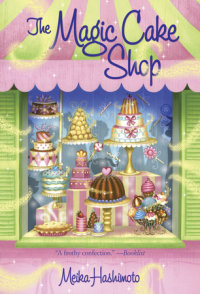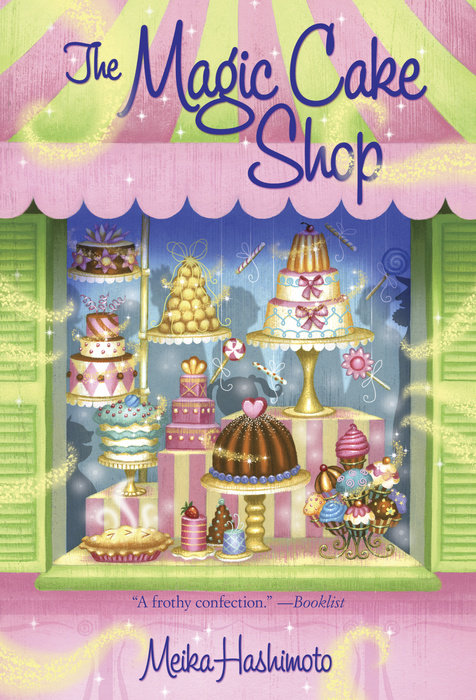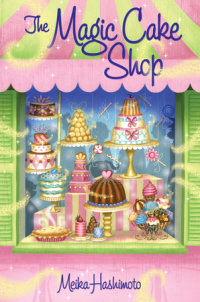The Magic Cake Shop
Emma Burblee couldn't be more different from her parents if she tried. She'd rather dig for treasure in a park than try on the latest fashions or discuss her vain parents' favorite subject: themselves. When Emma mortifies her parents at a dinner party, her punishment is immediate. She must spend the summer with her Uncle Simon—a loathsome man with a huge appetite for food and get-rich-quick schemes.
Although Emma's days revolve around cooking and cleaning, there is one bright spot. Her uncle's sweet tooth means she gets to visit the town bakery, Mr. Crackle's Cake Shop, all the time. This world-renowned baker is as charming and kind as Uncle Simon is vile. But then Emma discovers a plot by Uncle Simon and one of his shady acquaintances: they've set their sights on ruining Mr. Crackle—and the entire dessert making industry, for that matter! Can Emma stop their evil plan?
First-time author Meika Hashimoto's effervescent tale, filled with funny characters and adventures, will have readers checking their cupboards for mouth-watering ingredients and secret portals.
An Excerpt fromThe Magic Cake Shop
Mr. and Mrs. Burblee were very beautiful. Mrs. Burblee had a delicate chin, dainty earlobes, and a charming smile. Mr. Burblee had a rugged chin, manly earlobes, and a winning smile.
When Mrs. Burblee went for a walk, many a man tripped over his feet in a rush to say hello. If Mrs. Burblee said hello back, the goggle-eyed man usually fell off the sidewalk, sometimes into oncoming traffic.
Mrs. Burblee took this as a compliment.
When Mr. Burblee took a ride on his motorcycle, he liked to grin at the lady drivers at stoplights. They usually fainted. In the past year, Mr. Burblee had been responsible for eighty-two traffic jams.
He liked to keep count.
From the moment they opened their dazzling eyes in the morning to their eighty-step face-washing ritual before bed, the Burblees busied themselves with powdering, perfuming, and polishing. When they weren't applying lotion or slicking hair or beautifying themselves in hundreds of ways, they bickered over who got to be admired.
"What shall we talk about today?" Mr. Burblee asked Mrs. Burblee one morning over a breakfast of carrots and celery. "Shall it be the noble shape of my nose or my fabulously silky locks of hair?"
Mrs. Burblee pouted her rosy lips and frowned. "We talked about your hair yesterday. It's my turn. I want to compose poems about the graceful curves of my feet."
"As long as it's my nose tomorrow," Mr. Burblee huffed, sinking his pearly teeth into a celery stick.
For the rest of the day, they wrote odes to Mrs. Burblee's feet.
The Burblees lived in a fancy apartment building named Stoney Henge in a wildly expensive part of the city. Stoney Henge was built of solid steel and granite. High-heeled women clacked their way through the lobby night and day, while loud-talking men in suits bragged about their latest business deal. The elevator buttons were lined with diamonds that had a nasty habit of nicking fingers.
Inside the Burblees' apartment, expensive furniture was perfectly arranged throughout each room. In the dining room, gold-encrusted stone-hard chairs made for stylish but uncomfortable mealtimes. Snarling gargoyles in the bathroom stared at anyone who entered and made it difficult to do one's business.
In the Burblees' bedroom, gigantic dressers stuffed with Mr. Burblee's designer socks stood next to shelves full of Mrs. Burblee's nail products. Deep closets opened up to a carefully arranged onslaught of accessories, including Mr. Burblee's prize collection of polka-dot ties and Mrs. Burblee's three hundred pairs of earmuffs.
The spare room next door held nothing but clothes.
The Burblees had lived in Stoney Henge ever since Mr. Burblee made millions off a fancy hat boutique called Chic-Chic. The boutique was the sort that had tall, thin-lipped clerks with pointy noses that they would stick up if you didn't enter the shop with the latest style of purse or sunglasses. Chic-Chic decorated hats with things like hummingbirds and mousetraps and insisted the models be photographed in places like Mozambique and Antarctica. This was supposed to make the hats seem more fashionable.
Mr. Burblee was very good at bringing customers to Chic-Chic. "The trick," he boasted to Mrs. Burblee one night at dinner, "is to make women feel rotten about themselves. Once you make them feel ugly, they'll be desperate to buy anything that seems to make them instantly beautiful."
"Is that so?" murmured Mrs. Burblee, picking daintily at her lettuce.
"Remember that commercial I ran on television last year? The one where I painted zits on your nose and warts on your cheeks and had you wear that hideous wig with gray streaks?"
"And then you had me wander into Chic-Chic, put on a hat, and transform into my usual ravishing self? Yes, I remember--I was there," said Mrs. Burblee with a touch of irritation. "You never stop talking about that commercial. I know it was a success and we made a fortune, but you really had nothing to do with it."
"Of course I did! I came up with the idea!" sputtered Mr. Burblee.
"But I was the model. Without me, no one would have remembered your idea. My irresistible beauty is the reason why Chic-Chic is so popular." Mrs. Burblee smiled and primped her hair.
Mr. Burblee scowled.
"Don't scowl--you'll get wrinkles," said Mrs. Burblee.
They finished the rest of their dinner in silence.
In addition to being a model for Chic-Chic, once a week Mrs. Burblee pumped up sales by working behind the counter at the boutique. She was very good at charming hordes of men into buying pricey eggbeater or porcelain hats. "Trust me," Mrs. Burblee would coo to a male customer, "your wife will love it." She would give him a smoldering look, and before he knew it, the befuddled man would have his credit card swiped and his hands full of a hatbox.
Chic-Chic had a no-return, no-refund policy.
Working together, the Burblees did ripping good business. Mrs. Burblee bamboozled men into handing over their wallets, and Mr. Burblee's commercials brought in women desperate to seem fashionable at any cost.
Chic-Chic allowed the Burblees to live a life of complete luxury. They drank fancy champagne and ate rare caviar by the gallon. Mrs. Burblee had a jewelry box stuffed with emeralds and pearls. Mr. Burblee kept his seventeen yachts in the most expensive boathouse in the city. Together they owned a small island in a fashionable part of the Pacific Ocean.
But despite their wildly good looks and fortune, the Burblees had one great, terrible blot on their dipped-in-gold world.


